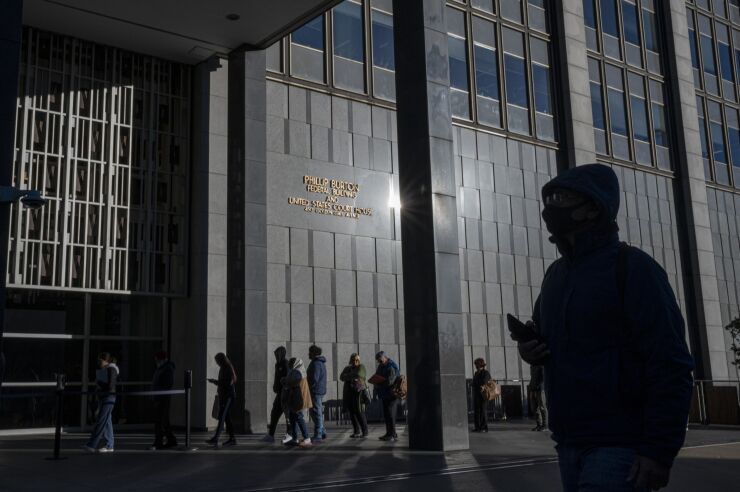A federal judge has placed the future of decentralized finance in question with an early June ruling that a DAO, shorthand for a decentralized autonomous organization, can be held liable for violating commodity exchange rules.
In what regulators have
On the heels of another Orrick ruling in December allowing the DAO's token holders to be served via a chatbot post in a community forum, the ruling suggests that the anonymous members who govern unincorporated blockchain protocols through majority voting systems share liability for the organization's missteps.
"It smokes out the reality that the emperor has no clothes," said Daniel Kolber, counselor at Warren Law Group and owner of Intellivest Securities, Inc. "In order to have accountability, you can't have anonymity."
Other organizations that purport to be decentralized, and that challenge mainstream financial institutions with promises of fairer and lower-cost options, could be subject to the same regulation going forward, Kolber added — potentially disincentivizing investment in the defi space.
"This now puts a big cloud of uncertainty over, not only DAOs, but everything decentralized," Kolber said. "The market hates uncertainty."
Founded in 2017, bZeroX developed and marketed its protocol as a de facto trading venue. Trades were self-executed through smart contracts that automated a trade on the blockchain according to pre-agreed terms.
After being accused by the CFTC of operating as an illegal futures commissions merchant in 2021, bZeroX was restructured as a DAO.
"It's really exciting. We're going to be really preparing for the new regulatory environment by ensuring bZx is future-proof," said bZeroX founder Kyle Krister in a public statement when the company became a DAO. "What we're going to do is take all the steps possible to make sure that when regulators ask us to comply, that we have nothing we can really do because we've given it all to the community."
The founders handed control of the protocol, which they renamed Ooki DAO, over to the entirety of its anonymous token holders. After being given administrative keys, members could vote on how to control and govern the protocol — supposedly without bearing responsibility for it.
The CTFC was unimpressed.
The commission sued Ooki Dao for intentionally attempting to duck commodities trading laws by decentralizing in 2022, alleging that the DAO had acted as an illegal trading platform by failing to adhere to CEA requirements to register as a Futures Commission Merchant and conduct know-your-customer checks.
Ooki DAO was sued as an unincorporated association without a limited liability shield — like a golf course, nonprofit or a charity. That implied that each individual member of the DAO would be responsible for the alleged violations of the CEA.
In October, the DAO's individual token holders were allowed to be served through a chatbot post on the Ooki.com website.
Andreessen Horowitz, a venture capital heavyweight with $35 billion in assets under management that has bet heavily on the crypto industry and is reportedly moving to the U.K. in hopes of a more favorable regulatory environment, was among several organizations that filed amicus briefs contesting that mode of service and identification.
Amici briefs argued that Ooki DAO could not act as a defendant or be served for reasons including that it was a technology rather than an entity, and that it was not an unincorporated association or subject to enforcement under the CEA.
Judge Orrick threw the challenges out of court.
When Ooki DAO missed the January 2023 deadline to respond to the lawsuit, the commission asked Orrick to rule in its favor by default. He accepted.
The DAO was asked to cease all operations and pay a $643,542 penalty among its identifiable members, though it remains
The ruling is one of the first indications of how U.S. federal courts will treat DAOs.
That will likely set the precedent that blockchain custodians "can't just cloak themselves in immunity through anonymity," Kolber said.
The case highlights that the crypto community needs to work more transparently with regulators as it is overshadowed by accusations of illegal trading against Binance, the world's largest cryptocurrency exchange, and Coinbase, the largest US-based crypto exchange, said Arina Shulga, a partner at Nelson Mullins Riley & Scarborough LLP.
"We're not in some fantasy world," Shulga said, adding that heightened regulatory scrutiny may help fan out the cloud of fraud and distrust that bad actors in the crypto industry have kicked up.
To shield themselves from unwanted liability, those interested in working with decentralized venues should subject them to the same scrutiny that they would to any other potential business or investment partner, Shulga added.
"Treat DAOs like any other 'person' subject to U.S laws," she said.
Questions still hang over the future of defi, including whether any structure can be 'decentralized' in practice, Shulga said.
Kolber added that DAOs may choose to take on a corporate form. That would create a so-called "legal wrapping" to protect individual members from liability by limiting what pay-back creditors can receive to the DAO's treasury.
In Utah and Wyoming, laws have already been passed that recognize DAOs as traditional limited liability companies distinct from their individual members.
But the CFTC's message is clear.
"This decision should serve as a wake-up call to anyone who believes they can circumvent the law by adopting a DAO structure, intending to insulate themselves from law enforcement and ultimately putting the public at risk," said CFTC Division of Enforcement Director Ian McGinley.







